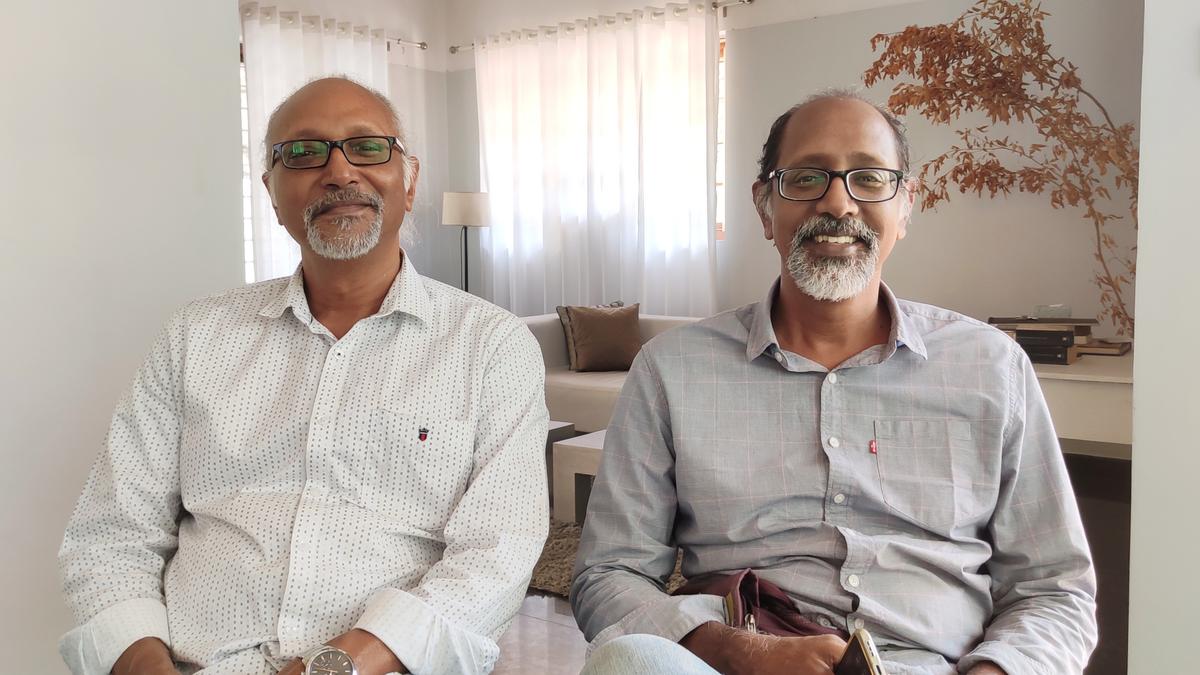
Malayalam directors Satish Babusenan and Santosh Babusenan on their new movie, ‘Anand Monalisa Waits For Death’
The Hindu
Malayalam directors Satish and Santhosh Babusenan on Anand Monalisa Waits For Death
Satish: Life is full of uncertainties. The only certainty is that we must all die one day, sooner or later. This thought can be scary because it messes with all the plans we make for the future. We build dreams about one’s life, the future of our children and family, or about a million things that we hope will make us happy. Then we hope that these dreams will come true. Across centuries, society has made hope into a virtue. But, in my understanding, it is just the opposite. Hope is fear dressed up as something pretty. It is what we use to escape facing the reality of facts. These are the thoughts that my brother and I decided to explore in our new movie, a story about a young man facing imminent death.
Santosh: We were trying to deal with the human problem of uncertainty. The regular escape route is Hope, but that only adds to the problem. The better option is to keep the mind free of hope and to accept reality, however hard it may seem. This is the thought we wanted to discuss in the film without sounding too pedantic or preachy.
Satish: It was quite a good feeling when the award was announced. It also won our lead actor Kaladharan chettan a Special Jury Award, and Best Actor at the New York Indian Film Festival. Actors and technicians deserve praise when they do a great job. Also, our films get screened at good film festivals. Without those screenings, who would see their hard work?
But, for us personally, recognition doesn’t mean much. There was a time when appreciation mattered. Experience has taught us that cheering and booing are easily interchangeable and have little to do with the quality of one’s work.
Santosh: Awards certainly make us happy. But we try not to let that blind us to the immensity of the task we have set before us. We are in pursuit of quality — mainly artistic — and we know we’re still far away from that thinly populated stratosphere where it’s really hard to breathe. We’re truly glad that over the years we’ve accumulated a bunch of actors and crew who share that vision with us.
Satish: Indeed, a film needs a market, it needs to earn its upkeep. People who slog on it need to be paid. Our films are not made for entertainment.
Consequently, they can only be thrown into the arthouse market. That market has its requirements too. The world over, it is issue-based art that succeeds there. If you look at the films from India which make it to these major markets abroad, they are all about issues that Indians face — gender, inequality, corruption, infanticide… There are good filmmakers who make films on these themes. However, such themes don’t excite us.

“Writing, in general, is a very solitary process,” says Yauvanika Chopra, Associate Director at The New India Foundation (NIF), which, earlier this year, announced the 12th edition of its NIF Book Fellowships for research and scholarship about Indian history after Independence. While authors, in general, are built for it, it can still get very lonely, says Chopra, pointing out that the fellowship’s community support is as valuable as the monetary benefits it offers. “There is a solid community of NIF fellows, trustees, language experts, jury members, all of whom are incredibly competent,” she says. “They really help make authors feel supported from manuscript to publication, so you never feel like you’re struggling through isolation.”

Several principals of government and private schools in Delhi on Tuesday said the Directorate of Education (DoE) circular from a day earlier, directing schools to conduct classes in ‘hybrid’ mode, had caused confusion regarding day-to-day operations as they did not know how many students would return to school from Wednesday and how would teachers instruct in two modes — online and in person — at once. The DoE circular on Monday had also stated that the option to “exercise online mode of education, wherever available, shall vest with the students and their guardians”. Several schoolteachers also expressed confusion regarding the DoE order. A government schoolteacher said he was unsure of how to cope with the resumption of physical classes, given that the order directing government offices to ensure that 50% of the employees work from home is still in place. On Monday, the Commission for Air Quality Management in the National Capital Region and Adjoining Areas (CAQM) had, on the orders of the Supreme Court, directed schools in Delhi-NCR to shift classes to the hybrid mode, following which the DoE had issued the circular. The court had urged the Centre’s pollution watchdog to consider restarting physical classes due to many students missing out on the mid-day meals and lacking the necessary means to attend classes online. The CAQM had, on November 20, asked schools in Delhi-NCR to shift to the online mode of teaching.









